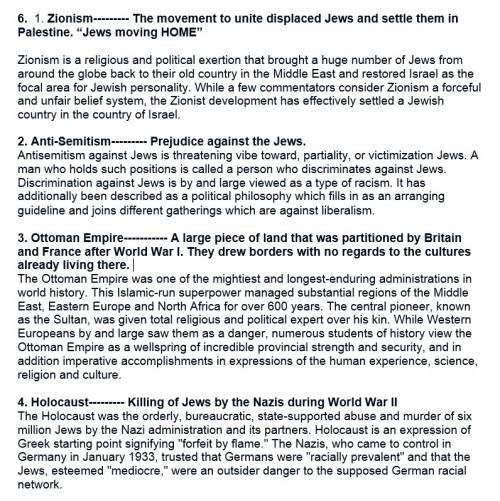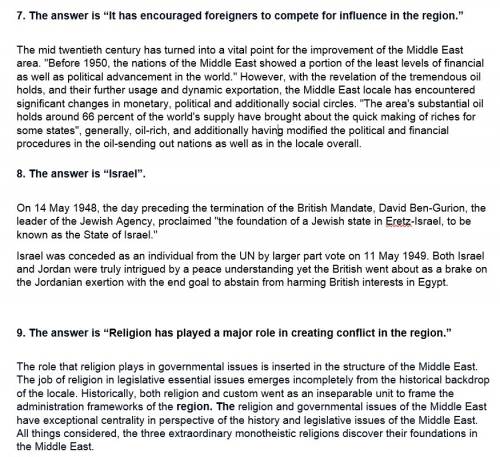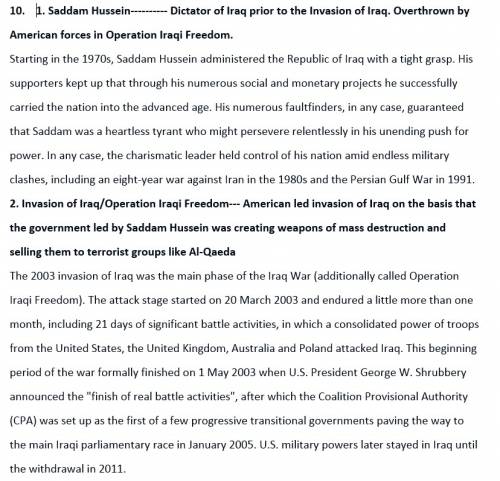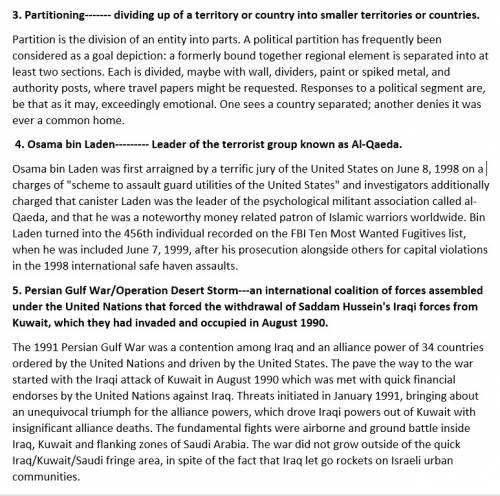1. The answer is “The modern day nation of Israel would not exist on the older map”.
The Middle East has seen extreme changes not long after the finish of World War II in 1945. Around then, the district what is presently called Israel was as yet possessed by the British, so still wasn't existing on the guide. Israel recovered freedom in 1948, not long after the British Mandate terminated. The following day, Arab nations propelled full-scale attack of Israel that finished the Arab-Israeli War.
2. The answer is “Displaced Jews wished to return to Palestine, and the U.N. voted to support their desires to return to their homeland after the suffering of the Holocaust.”
Israel's creation was not only a reaction to the Holocaust: While the facts demonstrate that Holocaust stirred worldwide general feeling in help of Jews, and quickened Jewish migration to Israel, it is additionally obvious that every one of the variables that prompted the production of Israel were at that point well set up before the Holocaust occurred. There was a very long time of European enemy of Semitism, an unequivocally felt Zionist development among Jews, a large number of Jewish foreigners in Palestine, and a global crusade to produce discretionary help. In some ways, the Holocaust discouraged Jewish migration, since Nazi governments generally denied it and in light of the fact that it cleared out Europe with such a large number of less Jews to emigrate. The subject of how enormous a job the Holocaust played in paving the way to Israel's creation is bantered among researchers, yet the fact of the matter is that it was in no way, shape or form, in spite of the across the board misguided judgment, the main critical driving force for Israel's creation.
3. The answer is “It caused conflicts between religious and ethnic groups”.
The Ottoman Empire spread over North Africa and the whole Middle East. It was begun in present day Turkey.
The Ottoman Empire was named for its first ruler, Osman.
The Ottoman Empire assumed control Constantinople in 1453 and renamed it Istanbul.
At the point when the Europeans were dividing the Ottoman Empire they didn't think about the diverse ethnic gatherings. One ethnic gathering that did not get its on nation were the Kurds. The Kurds live on the outskirts of Turkey, Syria, Iraq, Iran, Armenia and Azerbaijan. Numerous nations would prefer not to surrender their property in view of water sources. On the off chance that the Kurds were to get its very own nation it would be situated on the greater part of the Tigris and Euphrates River.
4. The answer is “Both Arabs and Jews claim rights to the land in Israel.”
The historical backdrop of the Israeli– Palestinian conflict started with the foundation of the province of Israel in 1948.
The Israeli– Palestinian conflict is the progressing battle among Israelis and Palestinians that started in the mid-twentieth century. The inceptions to the contention can be followed back to Jewish migration, and partisan clash in Mandatory Palestine among Jews and Arabs. It has been alluded to as the world's "most obstinate clash", with the continuous Israeli control of the West Bank and the Gaza Strip achieving 51 years.
5. The answer is “Location of religious and ethnic groups”.
After the fall of the Ottoman Empire, European legislators drew up new outskirts for Mandates (domains that are among states and free nations). The land was partitioned up between Great Britain and France. The outskirts did not mull over the diverse ethnic and religious gatherings in the locale.



